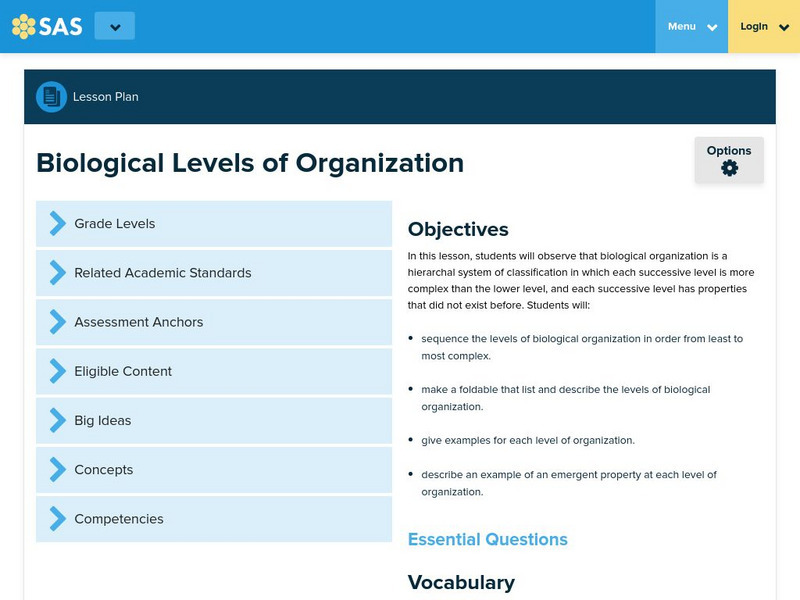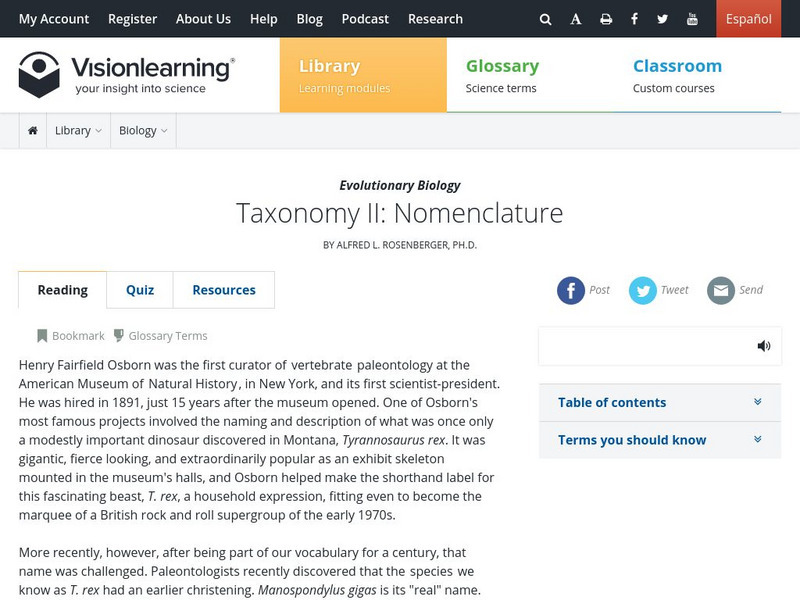Soft Schools
Soft Schools: Classification of Organisms Quiz
Take an interactive quiz over the classification of living things. After completing the quiz, check your score, and then revisit any incorrect question for further review.
Other
Pennsylvania Doe: Lesson Plan: Biological Levels of Organization
A lesson plan that takes students through the process of organizing a set of biological picture cards according to levels of complexity.
Vision Learning
Visionlearning: Evolutionary Biology: Taxonomy: Nomenclature
An explanation of how living organisms are named and the importance of naming them accurately.
Encyclopedia of Earth
Encyclopedia of Earth: Conservation Biology: Orangutan
Information about the orangutan: its scientific classification, physical features, reproduction, behavior, diet, habitat, threats to its survival, and efforts being taken to protect it. (Published: August 7, 2010)
Encyclopedia of Earth
Encyclopedia of Earth: Evolutionary Biology: Mammal
Article explaining the basic characteristics of mammals, their diet, reproduction, behavior, conservation concerns, taxonomy, and their evolution. (Published: September 23, 2010)
CK-12 Foundation
Ck 12: Biology: Fish Classification
[Free Registration/Login may be required to access all resource tools.] Discusses how fish are classified.
BiologyWise
Biology Wise: Roundworm Characteristics
Describes roundworm characteristics, including their classification, habitat, reproduction, infection of humans and pets, and how they are transmitted to other hosts. Includes some examples and the diseases they cause.
Georgia Department of Education
Ga Virtual Learning: Forensic Toxicology
What is the role of the toxicologist in a forensic investigation? In this comprehensive interactive tutorial explore how drugs are analyzed and what their results indicate within a forensic laboratory. Discover what laws govern the use...
BiologyWise
Biology Wise: Monocot vs. Dicot
One way plants have been classified has been based on the number of cotyledons in the seeds. The differences between monocots and dicots are listed along with some helpful facts.
BiologyWise
Biology Wise: Three Domains of Life
Describes the characteristics of Archaea, Bacteria, and Eukarya, the three domains of life.
Curated OER
Secondary Science Program: The Six Kingdoms
A short overview of the six kingdoms in our scientific classification system: Plants, Animals, Protists, Fungi, Archaebacteria, and Eubacteria. A good explanation of how organisms are placed in their particular kingdom.
Curated OER
Secondary Science Program: The Six Kingdoms
A short overview of the six kingdoms in our scientific classification system: Plants, Animals, Protists, Fungi, Archaebacteria, and Eubacteria. A good explanation of how organisms are placed in their particular kingdom.
Curated OER
Secondary Science Program: The Six Kingdoms
A short overview of the six kingdoms in our scientific classification system: Plants, Animals, Protists, Fungi, Archaebacteria, and Eubacteria. A good explanation of how organisms are placed in their particular kingdom.
Curated OER
Secondary Science Program: The Six Kingdoms
A short overview of the six kingdoms in our scientific classification system: Plants, Animals, Protists, Fungi, Archaebacteria, and Eubacteria. A good explanation of how organisms are placed in their particular kingdom.









